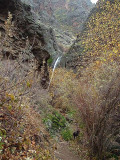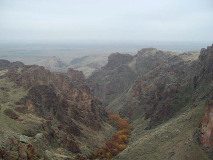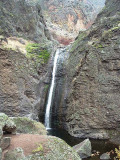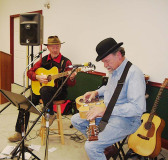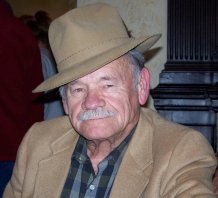No products in the cart.
Obadiah Jump
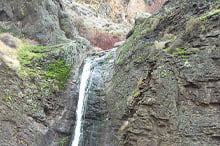
Only Joking
By John M. Larsen
In 2005, Tom “Doc” Couch, who was director of the Owyhee County Historical Society, received a call from a man named Phillip Gary Eller. He asked, “Where did Jump Creek get its name?”
Jump Creek is most famous for its sixty-foot waterfall with natural pools near Melba that is a popular day hike. Doc passed the question on to me, because my parents had co-founded the county historical society and I had been closely involved in it for a long time, but I had to admit I did not know the answer. I promised to look around and see what I could find. I checked all my available sources but came up empty. It seemed that Gary Eller had a musical group who wanted to call themselves the Jump Creek Boys, which is why he had called Doc.
It so happens that Doc and I were in the habit of kidding each other whenever the opportunity presented itself. For example, one time when other board members and I were working on the display hall, we accidently cut off the electrical power to his office. In the past, Doc and I had had religious discussions on which we disagreed. On this day, when he came boiling out of his office, complaining that his power had been cut off and he hadn’t saved his work, I counseled him, “Tom, even Jesus saves.”
In return, he pulled one on me. So when he later told me that Gary had asked again how Jump Creek got its name, I gave Doc a story in retaliation. I never dreamed he would take me seriously and pass the information on to Gary.
I told Tom that Jump Creek was named after Obadiah Jump, who gained fame and notoriety by being the worst fiddle player in the West. When outlaws had to check their guns at the Silver City limits, Obadiah had to check his fiddle, as they would not let him into town carrying such a formidable weapon.
The trail into Jump Creek Falls. P. Gary Eller.
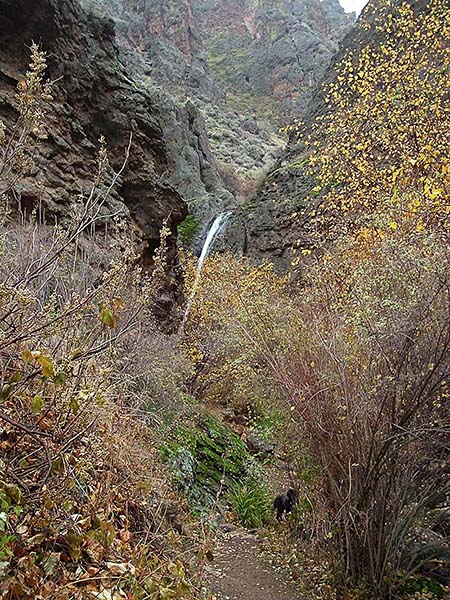
The Jump Creek drainage. P. Gary Eller.
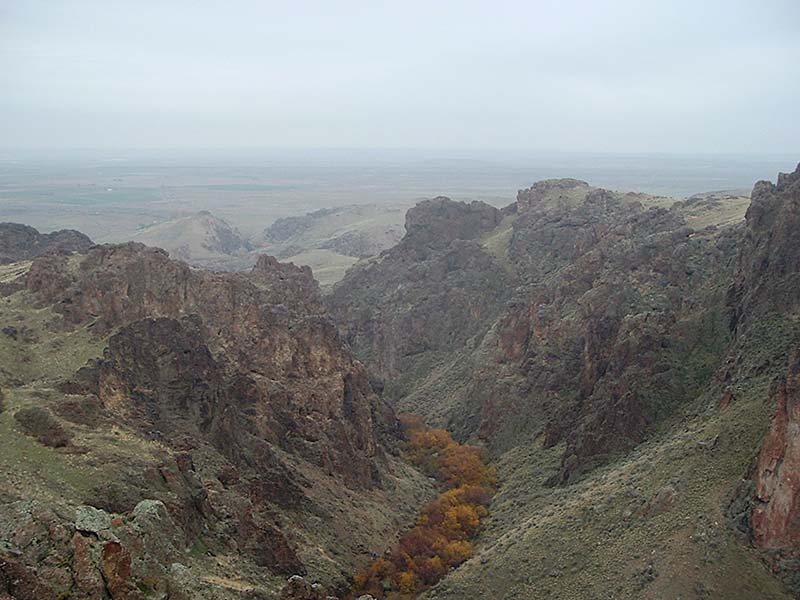
Closeup of the falls. P. Gary Eller.
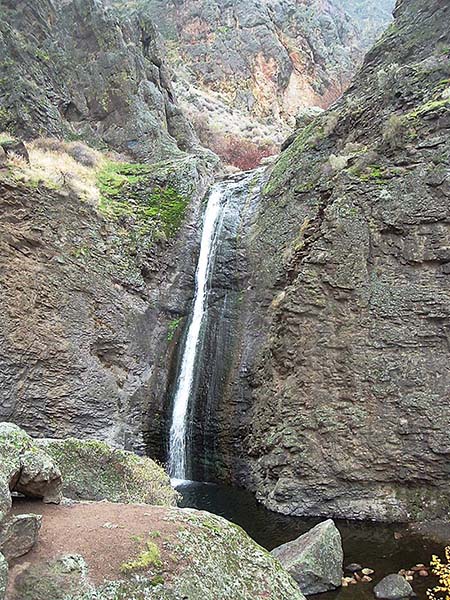
Gary Eller (left) and John Larsen at Owyhee County Museum. Courtesy P. Gary Eller.
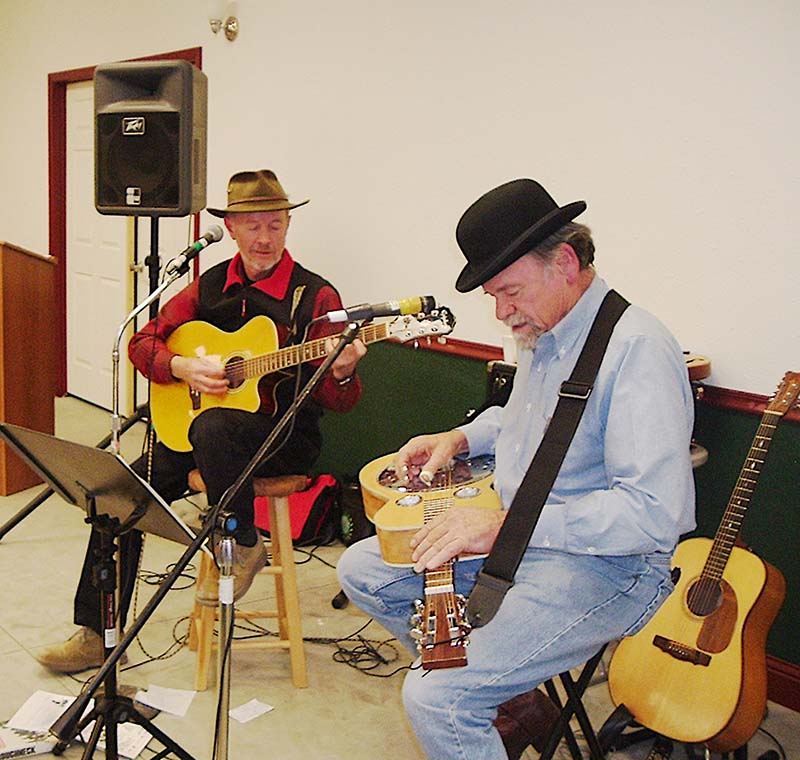
Sometime later I received news that Gary, whose friends call him Slim, was performing with the Jump Creek Boys at local school assemblies, where he was telling the story of Obadiah Jump. Gary had composed a song about him, whose lyrics were portrayed as authentic. Here’s how “Obadiah Jump” went:
Obadiah Jump in ‘63 came to find some gold.
High up in the Owyhees, in the wind and heat and cold.
Jump brought along a mule and gun, he began to mine.
Had a fiddle he called Bessie Lou, to pass away the time.
At first the townfolk all were thrilled, with a fiddler of their own.
Soon enough they found out, he was awful with the bow.
The sheriff told old man Jump he could live with the mule and gun.
That devil’s box just wouldn’t do, can’t bring it into town.
He found no gold and the grub ran out, so he moved to the flats below.
By a little creek he tried to farm, but the beans just wouldn’t grow.
The farm went bust and Jump moved on, took his fiddle far away.
As a joke the neighbors named his stream, and it’s Jump Creek to this day!
With a heavy heart and gritted teeth, I called Gary to confess that the story was a spoof.
He was not pleased.
To understand how displeased he was, one must look at his history. He had come from West Virginia, not the most prosperous state in the union. He distinguished himself among his peers by hanging in there until he obtained a PhD in chemistry. He then was employed for thirty years by the Los Alamos Laboratory in New Mexico until retiring and moving to Idaho. This was a man who had dotted every “i” and crossed every ‘t” and now he wanted to talk to me face-to-face.
I did not look forward to the moment when he and fellow musician Marv Quinton, who had been with Gary on the tours of the area schools, would come to my home at Sunrise Skypark near Melba.
When they arrived, I explained it had been a joke on Tom Couch and it did not occur to me that he would pass on the story. Later, I realized Doc had passed it on even though he knew it was not for real. In the end, I talked it out with Gary and Marv in the language we all knew best, which was musical jamming, and they asked me to join their tour of the schools.
I felt glad about this and somewhat vindicated. What I was unprepared for was that we went back to each of the schools the Jump Creek Boys had previously visited and, at the start of each program, I had to confess that I was the originator of the nefarious Obadiah Jump legend. In truth, though, Gary got a kick out of the song and it became one of his favorites.
After this rocky start, we went on to become the best of friends. Slim and I collaborated in various ways, such as holding song-writing classes and doing many musical gigs. We often co-wrote songs, in which I penned the verses and he did the chorus.
One of the most meaningful events in our relationship occurred when I was president of the Owyhee Historical Society. I proposed that the society should sponsor Slim on his Idaho Songs Project in cooperation with the Idaho Humanities Council. The council agreed and Slim took off on the project like a bloodhound on a fresh scent. He’s interested in songs prior to the radio era, which limited the search to 1923, and I think it’s safe to say that there now is not a university, county, or historical society collection in the state that he has not visited to see what he could find. He also has pursued relevant information in neighboring states. I call him the Raider of the Lost Tunes.
He is currently finishing up a 269-page history on the life of Clarence E. Eddy, the poet-prospector of the Old West. When he takes on a project, he stays with it until it is done. I imagine he has devoted thousands of hours to the Idaho Songs Project and the life of Clarence E. Eddy. Fittingly, he recently received the Governor’s Award for support of traditional arts.
As for Jump Creek, I discovered its name came from Bill Jump, an early prospector and miner who made a homestead along the creek about a mile below the falls. I learned this in 2018 from his grandson, who moved into a house near me when I lived at Sunrise Skypark.
As for Slim and me, I recently came up with a great new idea. He made a note of it and said with a grin, “I’ll check it out.”
This content is available for purchase. Please select from available options.
Purchase Only
Purchase Only

